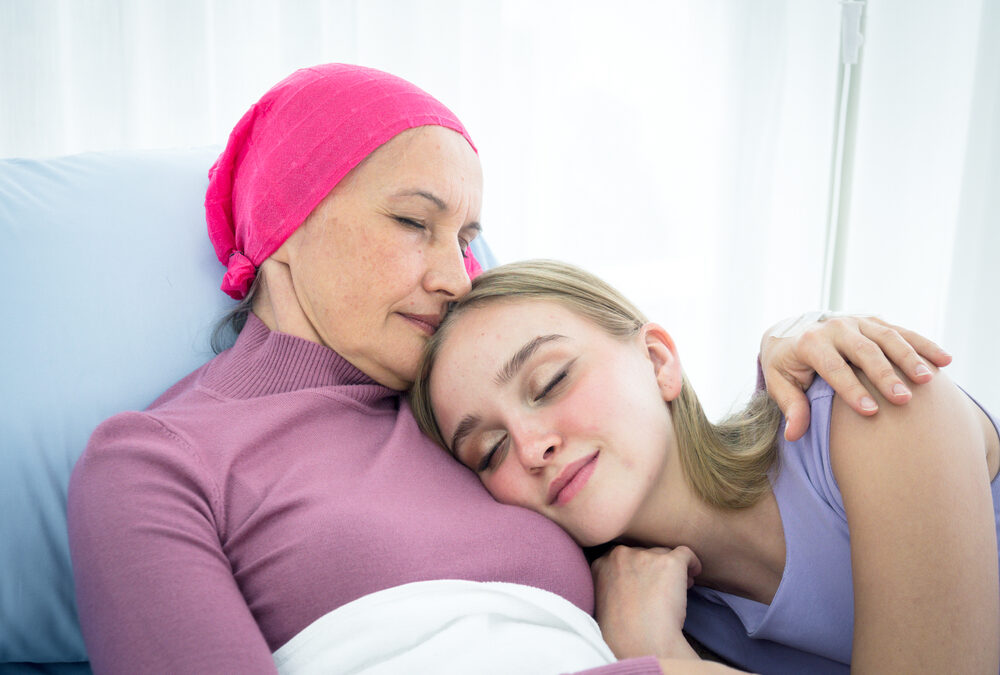Breast cancer is an alarming reality that affects countless people around the world. In the United States, approximately 1 in 8 women will develop invasive breast cancer during their lifetime, with an estimated 297,790 new cases expected in 2023 alone. It’s worth noting that breast cancer also affects men, with about 2,800 new cases projected for 2023.
While the number of breast cancer-related deaths has declined over the years, according to the American Cancer Society, breast cancer is still the most commonly diagnosed cancer among women globally and still stands as the second leading cause of death from cancer among women.
These statistics underscore the importance of addressing this topic with care, understanding, and a commitment to providing the best support possible, especially during the month of October, which is Breast Cancer Awareness Month.
Discovering that a cherished person in your life has been diagnosed with breast cancer can be an overwhelming and emotional experience. The initial shock, the flood of questions, and concern for their well-being can leave you feeling lost and uncertain about what to say and the best way to offer support.
In this blog, we will explore the various aspects of discovering that a loved one has breast cancer. You will learn:
- What to say to someone diagnosed with breast cancer.
- What not to say to someone diagnosed with breast cancer.
- How to support a loved one or a friend who finds out they have breast cancer.
- How to get involved in the fight against breast cancer during Breast Cancer Awareness Month in October.
- Where to get a breast cancer screening and find a breast cancer surgeon and oncologist in Tennessee.
Our aim is to equip you with knowledge, resources, and compassionate guidance to help you navigate this challenging chapter of life.
WHAT TO SAY TO SOMEONE DIAGNOSED WITH BREAST CANCER
Usually, when you find out a loved one’s going through a hard time, it’s instinctual to respond with something. But sometimes, despite our best intentions to offer comfort, our words mistakenly worsen the situation.
To make those diagnosed with cancer feel understood and less isolated, we should choose our words carefully to validate their pain and the uncertainty that cancer brings.
Here are some tips on how to communicate with a loved one recently diagnosed with cancer:
DON’T SAY ANYTHING, LISTEN
From the minute a doctor gives their patient a cancer diagnosis, a whirlwind of emotions, including fear and anxiety, can engulf the patient. It’s a transition to an entirely different way of life and a realm of healthcare that is unfamiliar, extraordinarily demanding, and incredibly stressful.
As you step into this journey alongside your loved one, it’s important to recognize that your presence alone can be a source of immense comfort. During these moments, listening, not speaking, takes precedence. Resist the urge to steer or control the conversation. Instead, create a safe and open space where your loved one feels free to express their worries, fears, and pain without reservation.
Listening with empathy and validation is key. It means not only hearing their words but also understanding the emotions behind them. Show that you genuinely care by being fully present and attentive. Offer words of reassurance such as, “I’m here for you” or “You’re not alone in this,” to let them know that you’re committed to supporting them through every step of this challenging journey.
Your presence alone can be a source of great comfort. In this time of vulnerability and uncertainty, your capacity to listen, empathize, and validate their experiences will become an invaluable source of strength and comfort.
ASK THEM WHAT THEY NEED
Breast cancer patients grapple with a multitude of challenges, particularly during breast cancer treatments like chemotherapy and radiation therapy. These treatments are known to carry significant side effects, which can profoundly affect their daily lives.
While you may not have the power to alleviate their medical challenges, you can provide support in numerous other ways. One of the most effective ways is by asking a simple yet profound question: “What do you need?”
They may say, “I don’t know.” Understand that they may not always have an immediate answer, and that’s perfectly fine. The act of asking itself conveys your willingness to go the extra mile for their well-being.
Their needs may vary widely, from practical tasks such as help with chores, meal preparation, or childcare to the less tangible but equally vital need for moments of solitude and rest. By initiating this conversation, you demonstrate your willingness to lighten their burden and provide the support they need during this challenging journey, reaffirming that they are not alone in this battle.
ACTUALLY, DON’T ASK, JUST DO IT
In the face of a breast cancer diagnosis, patients are often overwhelmed, and the magnitude of what lies ahead can be paralyzing. It’s not uncommon for them to be unsure of what they need at the moment, and that’s completely understandable.
In these moments of uncertainty, an alternative approach can provide immense relief: “Don’t ask, just do.” Take the initiative to figure out what would help make their life easier, more comfortable, or less stressful, and then go ahead and do it (as long as you aren’t crossing any boundaries.)
Consider the practical aspects of their daily life that might be challenging due to their condition. It could be as simple as preparing a nutritious meal, taking care of household chores, or offering to pick up groceries. Or perhaps they could benefit from a soothing massage, a thoughtful card, or just some quality time spent together..
USE HUMOR (IF APPROPRIATE)
Cancer treatment is undeniably a serious and demanding journey, but even with its challenges, humor can be powerful. As the saying goes, “Laughter is the best medicine,” and it holds true even in the face of cancer.
Humor has a unique ability to lift spirits, ease tension, and create moments of relief amid adversity. However, it’s essential to approach humor with sensitivity and thoughtfulness, always keeping your loved one’s feelings in mind.
Understanding their individual sense of humor is also crucial, as people have diverse tastes regarding what tickles their funny bones. Tailor your efforts to align with their personality, ensuring that your attempts at humor are genuinely enjoyable rather than unintentionally uncomfortable.
Moreover, be mindful of the context and timing. Cancer treatment can bring about a range of emotions, and there may be moments when humor is more appropriate and welcomed than others. It’s crucial to gauge their mood and the situation, ensuring that your efforts to lighten the mood are well-timed and considerate.
Above all, remember that it’s okay to try and make them laugh. A well-placed joke or a lighthearted comment can be a welcome breath of fresh air during a breast cancer diagnosis.
BE EMPATHETIC AND RESPECT BOUNDARIES
One of the worst things you can do for anyone going through a hard time is be sympathetic.
Be empathetic instead.
Sympathy often entails offering pity or feeling sorry for another person’s situation, which, while well-intentioned, can inadvertently create a sense of distance. In contrast, empathy involves the profound act of understanding and sharing in the emotions and experiences of another.
It’s about putting ourselves in their shoes, recognizing their feelings as valid, and conveying that we genuinely care. By being empathetic, we bridge the gap between ourselves and our loved ones, forging a deeper and more authentic connection that empowers them to navigate their challenges with a sense of companionship and understanding.
Researcher Brene Brown does an excellent job explaining this, sharing that empathy simply means feeling with people. “Empathy means perspective taking, staying out of judgment, recognizing emotion in others, and communicating that.”
In addition to showing empathy, it’s vital to honor and acknowledge any boundaries your loved one establishes during this challenging time. Whether they express a need for solitude, outline specific guidelines for interaction, or convey their preferences and limitations, respecting these boundaries is fundamental to providing effective support.
Always remember that their cancer diagnosis is primarily about their journey and well-being, not your feelings or intentions. Refraining from taking anything personally and respecting their boundaries creates an environment of trust and understanding.
MEAN WHAT YOU SAY
Genuine intentions matter. When you make a promise or offer assistance, it’s crucial to genuinely mean what you say. If you promise to be there for someone, make it a point to follow through with your commitment.
When that call or text comes, be ready to follow through on your actions and words of support. That said, it’s perfectly normal to encounter moments when you’re unsure what to say or how to offer comfort. In such instances, remember that it’s okay not to provide the perfect inspirational quote or offer grand gestures. Sometimes, all that’s needed is your presence and the willingness to listen.
WHAT NOT TO SAY TO SOMEONE DIAGNOSED WITH BREAST CANCER
Knowing what to say is only part of helping a loved one diagnosed with breast cancer. It’s equally important to know what not to say. This video by SELF does a great job of providing examples of things you should never say to a loved one with breast cancer.
Things You Should Never Say To A Loved One With Breast Cancer | SELF
Additionally, try to avoid saying any of the following phrases:
“I KNOW SOMEONE WHO HAD BREAST CANCER…THEY DIED.”
While your intention may be to share experiences and connect, mentioning someone who succumbed to breast cancer can amplify the fear and anxiety your loved one is already grappling with.
The “c-word” is scary, and people diagnosed with breast cancer are well aware that it can be deadly. Don’t add to the fear that your loved one is already feeling. The best thing you can do for them is to acknowledge their feelings and fears without dismissing them and offer empathy as a source of solace.
“YOU’RE SO BRAVE”
While it may seem like an encouraging compliment, telling your loved one with breast cancer that they are “so brave” can sometimes be misconstrued. Often, patients might respond with statements like, “I have no choice” or “It’s what I have to do to survive.”
The psychology behind this response lies in the understanding that facing a cancer diagnosis doesn’t always feel like a conscious choice; it’s a necessity for survival. While the sentiment behind “you’re so brave” is well-intentioned, it can unintentionally undermine the complexity of their situation.
Rather than focusing solely on their perceived bravery, engage in conversations that allow them to express their thoughts and feelings about their diagnosis and treatment. Encourage open dialogue, allowing them to share their experiences without judgment.
There’s a time and place for positive affirmations and expressions of admiration, but in these moments, it’s often more meaningful to be a compassionate listener and acknowledge the unique challenges they are facing on their journey toward recovery.
“HAVE YOU TRIED___?”
While well-meaning, asking your loved one if they’ve tried specific treatments or remedies can inadvertently place added pressure on them. The best thing to do is support your loved one as they work with breast cancer surgeons, oncologists, and specialists to develop and follow their tailored treatment plan that considers their unique condition and needs.
Suggesting alternative treatments or approaches, even with good intentions, can inadvertently make them feel they are not doing enough or that their chosen path is insufficient. It’s important to trust their healthcare team’s expertise and respect the decisions they make in collaboration with their doctors.
Instead of offering unsolicited advice, encourage open communication about their treatment plan and any concerns they may have, and convey your support and willingness to assist in any way they find beneficial.
“AT LEAST YOU HAVE A ‘GOOD CANCER.'”
While some types of cancer have a high survival rate, especially if caught early, there is no such thing as a “good cancer.” While the intention behind saying this phrase may be to offer reassurance or find a silver lining, it can dismiss the physical and emotional challenges that come with any cancer diagnosis, including breast cancer.
Implying that the diagnosis is less severe can undermine their feelings of fear, anxiety, and uncertainty. Instead of attempting to minimize their experience, provide empathy and support by acknowledging the difficulty of their journey.
“IT COULD BE WORSE.”
Remember how we talked about empathy? Let’s talk about sympathy for a moment. Brené Brown shares that sympathy usually shows up in any phrase that starts out with “at least.” It’s well-meaning, and it can come from trying to help people be positive, but it also invalidates the deep and painful feelings breast cancer patients and survivors face.
Rather than attempting to downplay their experience, opt for empathetic responses acknowledging the depth of their feelings and experiences. Remember that empathy involves connecting with their emotions and providing genuine support without trying to steer them toward positivity.
By validating their feelings and offering a listening ear, you create a safe space where they can express their concerns and fears without judgment, helping them feel understood and less alone during their breast cancer journey.
“BUT YOU’RE BETTER NOW.”
While it’s natural to express relief and joy when a loved one enters remission, it’s important to understand that the journey of a breast cancer patient is a complex and ongoing process. Remission signifies a significant milestone, but it does not guarantee that the cancer is permanently gone. There is always a chance of recurrence.
Approach their situation with sensitivity and acknowledge the continuous vigilance and challenges that come with living in remission. Offer your support and willingness to stand by their side throughout their journey, whether they are in active treatment or remission, understanding that the fear of cancer’s return can linger and require ongoing emotional support.
BEST WAYS TO SUPPORT A LOVED ONE DIAGNOSED WITH BREAST CANCER
If you’ve just received the jarring news that someone you deeply care about has received a breast cancer diagnosis, while processing this news, you may find yourself pondering a multitude of questions: What can I do to offer support during this challenging time? How can I make a meaningful difference in their journey towards recovery?
In this emotionally charged moment, it’s essential to remember that your support can make an immense difference in their journey toward healing. Here are some meaningful ways to be there for your loved one as they navigate this challenging path:
LEND A HELPING HAND
Enduring breast cancer treatment is undoubtedly a battle, and your support can be a lifeline during this challenging journey. As we mentioned earlier, there are times when it might be best not to ask but to take action proactively, especially considering that many newly diagnosed cancer patients may hesitate to seek assistance or may not even know what they need.
You understand your loved ones best, but in many cases, offering or directly taking on specific tasks can provide substantial relief. Here are some practical ideas to help you get started:
- Take care of their children: Offer to babysit or assist with childcare responsibilities to give them some much-needed downtime.
- Give them a ride: Transport to medical appointments can be a significant logistical challenge. Offering transportation assistance can ease their burden.
- Take notes at appointments: Treatment details and recommendations can be overwhelming. Attend medical appointments with your loved one and jot down important information.
- Assist with household chores: Simple tasks like cleaning, laundry, or meal preparation can make a substantial difference in their daily lives.
- Go grocery shopping or cook for them: Getting their groceries and cooking meals can be physically taxing for someone undergoing treatment. Offer to go to the store for them and, if time allows, cook or prep some of their meals.
- Give them a night out: If they feel up to leaving the house, offer to babysit or take on responsibilities around the house so they can enjoy a night away. Or if your loved one with cancer is too ill to leave the house, at least offer to take over caregiving responsibilities to allow their primary caregiver a much-deserved break.
In addition to these practical acts of service, consider sending cards, messages, or even sharing funny videos or memes. Sometimes, a break from the seriousness of the situation can be a welcome and uplifting distraction.
LISTEN AND OBSERVE
Your loved one will likely experience a range of emotions, from fear and sadness to anger and uncertainty, and it’s essential to be an open, non-judgmental ear during these times. Create a safe space where they can express their thoughts and feelings without interruption, ensuring they feel understood and validated in your presence.
While your natural instinct may be to relate your own experiences or offer solutions, it’s often more beneficial to resist this urge. Each person’s journey with breast cancer is unique, and your role as a supporter is to acknowledge their emotions rather than trying to minimize or solve their problems.
Demonstrating active listening by paying attention to their body language, tone of voice, and emotional nuances can help convey your genuine care and concern. Moreover, assure your loved one that their feelings are entirely valid and natural, using phrases like “It’s okay to feel that way” or “Your emotions are completely understandable” to provide reassurance.
Respect their need for privacy and the pace at which they’re comfortable discussing their diagnosis or feelings openly. Additionally, physical comfort, such as offering a shoulder to cry on or a comforting hug, can often convey support more powerfully than words.
Maintain your presence as they navigate the various stages of their breast cancer journey by regularly checking in on them and asking how they’re feeling. By following up and showing continued concern, you can provide ongoing comfort and reassurance.
RESPECT AND SUPPORT THEIR DECISIONS
Breast cancer patients have a plethora of difficult challenges that eat away at their energy. Worrying about what someone else thinks of them should not be on the list.
Recognizing the significance of respecting your loved one’s choices and providing unwavering support is vital. This means acknowledging their autonomy and preferences as they navigate this challenging journey.
Firstly, respect their boundaries and when they want to pull away from interacting with you. Your loved one might need space or moments of solitude, and this isn’t a reflection of their feelings towards you but rather a crucial coping mechanism. Granting them the freedom to retreat when needed and respecting their need for personal space can be a valuable form of support.
Secondly, avoid offering unsolicited advice, especially regarding treatment choices. These decisions can be intensely personal and guided by complex medical factors. Instead, lend a supportive ear, allowing them to discuss their treatment options when ready. Your role here is to listen, reassure them of your support, and respect the autonomy they have in making these crucial decisions.
Their dietary choices are another area where offering unsolicited advice should be avoided. Cancer treatment often triggers changes in appetite and taste preferences. Rather than suggesting what they should eat, ask them about their food preferences and what comforts them. Sometimes, a simple indulgence in their favorite comfort foods can provide solace during challenging times.
Lastly, inclusive planning for family events or social gatherings is really important. Take into account their physical and emotional condition when organizing such occasions. Extend open invitations that emphasize your understanding and flexibility. This way, they won’t feel pressured to attend if they’re not feeling well, but they’ll know they are always welcome when they decide to participate.
BE PREPARED FOR PHYSICAL AND EMOTIONAL CHALLENGES
A breast cancer diagnosis is not just a single moment; it’s the start of a complex journey that unfolds over phases and can be a long, emotionally taxing process. Your loved one will experience a rollercoaster of physical and emotional challenges throughout this journey.
As a friend or caregiver, it’s essential to be prepared for the long haul. Caregiving for someone with breast cancer is more like a marathon than a sprint. There will be moments of triumph and joy but also difficult days filled with uncertainty and discomfort.
To provide the best support, it’s crucial to do your research and learn about the experiences of other breast cancer patients. This knowledge will help you better understand what your loved one is going through and allow you to be a more empathetic and informed source of support during this challenging journey.
One Woman Diagnosed With Breast Cancer Interviews Someone in Remission | SELF
DON’T FORGET TO TAKE CARE OF YOURSELF TOO
As a friend, and especially if you are the primary caregiver of someone with breast cancer, don’t forget that you are a valuable part of their fight and recovery. You can’t be an effective friend or caregiver if you don’t have anything to give.
The best thing to do is actively find ways to relieve stress. For example, exercising regularly, getting healthy amounts of sleep, and doing things you love will help you give your loved one the support they need.
There are also breast cancer support groups for family members of breast cancer patients where you can find help and process through your challenges.
JOIN THE FIGHT AGAINST CANCER DURING BREAST CANCER AWARENESS MONTH
If you have a loved one battling breast cancer, service is a healing activity. Joining the cause can give you and your loved one a chance to connect and work with other people facing the same challenges you are.
You can do this any time of year, but October marks a significant month dedicated to raising awareness about breast cancer and emphasizing the crucial aspects of research, early detection, and prevention.
October is International Breast Cancer Awareness Month, where caregivers, survivors, patients, friends, and family members band together to raise awareness about breast cancer and emphasize the crucial aspects of research, early detection, and prevention.
This period serves as a vital opportunity to unite communities worldwide, placing a spotlight on breast cancer and its impact on individuals. However, amidst the efforts to promote awareness, Breast Cancer Awareness Month also carries the weight of painful losses.
Over 43,000 individuals in the United States alone are projected to succumb to metastatic breast cancer this year. This sobering reality serves as an urgent call to action, highlighting the pressing need for increased research funding to save lives and enhance treatment outcomes.
Breast Cancer Awareness Month in October offers a perfect opportunity to support your loved one and the thousands of others impacted by breast cancer. Your actions, whether big or small, can significantly impact breast cancer awareness and support for those affected by the disease year-round.
Here are some inspiring ideas to make a difference:
Think Pink
Show your support by wearing pink attire or accessories throughout October, and encourage others to do the same.
Volunteer or Join a Race or Walk
Join volunteer programs or sign up to support events like the American Cancer Society’s Relay For Life, Komen Race for the Cure, Making Strides Against Breast Cancer, or any other breast cancer events in your community.
Engage friends and family to support your efforts. Alternatively, collaborate with your gym or fitness studio for a special fundraising class or host a sports tournament.
Share Facts
Use your social media platforms to share essential breast cancer facts, such as its prevalence, statistics, and the importance of early detection.
Educate on Screenings
Every year, thousands of women get screened during Breast Cancer Awareness Month thanks to awareness efforts. This also goes for male breast cancer patients. These screenings increase early detection and raise the survivability rate for breast cancer patients.
Encourage mammograms and self-exams, and lead by example by scheduling a mammogram for yourself as well.
Fund Research
If you are financially able, support research initiatives like the National Foundation for Cancer Research to advance breast cancer treatments and prevention.
Embrace Milestones
Celebrating a birthday, wedding, or special anniversary in October or beyond? Turn your milestone into a meaningful occasion by collecting donations for breast cancer research.
BREAST CANCER SURGEONS AND ONCOLOGISTS AT THE SURGICAL CLINICS IN TENNESSEE
If you or a loved one are looking for breast cancer treatment, call the breast cancer specialists at The Surgical Clinic. We offer full spectrum care and work with doctors, breast surgeons, plastic surgeons, oncologists, and surgical oncologists to evaluate your treatment options and create a customized treatment plan.
Our Nashville breast cancer surgeons provide many types of breast cancer removal surgery ranging from minimally invasive to intensive surgery. We offer the most advanced approaches to breast cancer treatment, targeted therapy, breast-conserving surgery, and reconstructive surgery.
Fill out a contact form here on our website, or give us a call today to schedule your consultation.

Dr. Mariana Chavez
General & Surgical Oncology
DOWNTOWN

Dr. Gretchen Edwards
General & Surgical Oncology
DOWNTOWN

Dr. William Polk
General & Surgical Oncology
DOWNTOWN

Dr. Patrick Wolf
General & Surgical Oncology
ST. THOMAS WEST

